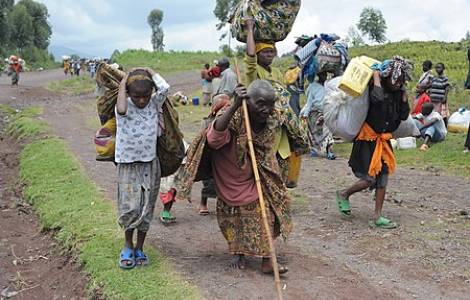
Wikipedia
Kinshasa (Agenzia Fides) - The war in North Kivu, in which the M23 is involved, is perceived by the Congolese as a war of aggression carried out by neighboring Rwanda with the help of this armed group. The M23 is known to have entered into talks with the Congolese government after its defeat in 2013, with the mediation of Uganda and led to the Nairobi Agreements of November 12, 2013. The M23 then resumed hostilities in 2021 under the pretext of non-compliance with the agreements. While the various parties to the conflict in the east of the Democratic Republic of Congo are vying for control of the local mineral resources, ethnic and land rights factors are also the cause of instability in the region. The latter are not just conflicts between different communities over the control of pastures or agricultural land. There are land disputes between farmers and large landowners, between rural communities and mining companies, between ranchers and farmers, and between national parks (e.g. Virunga National Park) and the local population. Access to land, particularly farmland, is therefore a cause of conflict between different ethnic groups, particularly in the Masisi area, where Hutus and Tutsis are considered immigrants and their access to land is contested by communities that consider themselves indigenous. Access to power is therefore an essential prerequisite for acquiring and maintaining land. The use of land is regulated by both written law and customary law. In written law, there are certain political-administrative authorities that have the power to grant land and others that are responsible for issuing land titles on behalf of the State. As far as customary law is concerned, the community leader is considered the guardian of the land, who can grant use of the land to his administrators upon payment of different fees depending on different customs. This dual registry - state and customary - creates further confusion and, in the latter case, can lead to discrimination based on ethnicity. The community leader is generally more inclined to favor members of his community at the expense of those who do not belong to it. The arrival of M23 militiamen in a given area disrupts this system of land registration. The rebels are displacing both state officials and local leaders, who are often left without people over whom they can exercise authority due to the forced displacement of the population. In certain other situations, traditional leaders are forced to coexist with the M23. Another guerrilla strategy is to destabilize the rule of a traditional leader by initiating and fueling traditional conflicts in the occupied territories. Since April 2022, the M23 has begun to gradually establish a parallel administration. The movement appoints the heads of the institutions it controls based on ethnicity or ties to the M23 or groups affiliated with it. (L.M.) (Agenzia Fides, 24/4/2024)